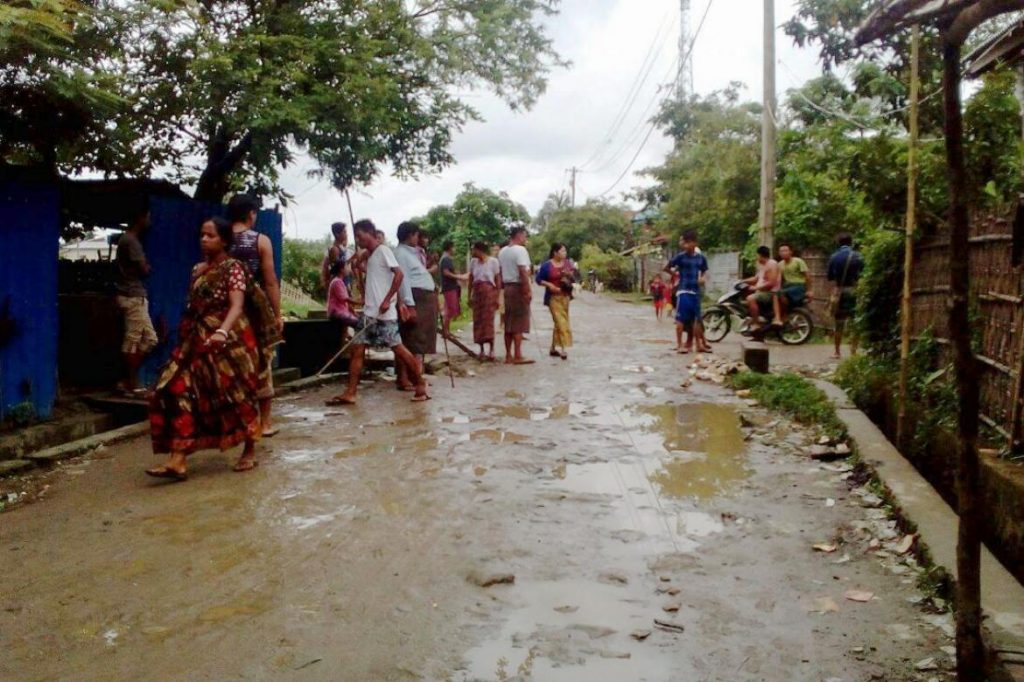By MRATT KYAW THU | FRONTIER
SITTWE — The security situation in northern Rakhine State is “under control”, according to the Rakhine State chief minister, U Nyi Pu, who visited the affected area on Sunday.
Security forces have conducted new “clearance operations” around Maungdaw and Buthidaung in northern Rakhine since coordinated attacks on Friday morning by the Arakan Rohingya Solidarity Army, which the government has officially declared a “terrorist group”.
“We arrived in Buthidaung and Maungdaw. We went to downtown Maungdaw and studied the situation. To tell you about the security, it seems to be under control,” Nyi Pu said. The chief minister had visited the affected area alongside Dr Win Myat Aye, union minister for social welfare, relief and resettlement.
However, the chief minister had not been able to visit the whole of the affected area.
Support more independent journalism like this. Sign up to be a Frontier member.
“To tell the truth, I haven’t seen the whole of Maungdaw Region, but according to Tatmadaw, Border Guard Police and administrative officials, we can say that according to the security measures, the situation is under control,” Nyi Pu told reporters in Sittwe, the state capital.
Win Myat Aye arrived in Sittwe on Sunday, where he met with state government officials before travelling to Maungdaw and Buthidaung by helicopter. He returned to Sittwe on Sunday evening.
He said they had seen several holes that appeared to be caused by bombs along the roads around Maungdaw.
“The soldiers and security forces were not able to go as far as they thought they could,” Nyi Pu said. “They had to clear the mines, and bridges were destroyed. Because they had to walk, there were many delays.”
The violence has left more than 100 dead since Friday. Ethnic Rakhine and other residents of Maungdaw have been evacuated to Sittwe and Rathedaung, while thousands of Rohingya have fled across the border to Bangladesh.
But authorities at the Bangladeshi border have refused to let most of them in, with reports saying that thousands of people, mainly women and children, are stranded along the “zero line” border zone.
In the immediate aftermath of the attacks, an unverified Twitter account purporting to represent ARSA claimed responsibility for the attacks, saying they were a “legitimate step” to “liberate” the Rohingya.
On Saturday, an AFP reporter and a Bangladeshi soldier at the Ghumdum border post said more than a dozen mortar shells and countless machine gun rounds had been fired by security forces towards Rohingya trying to flee across the border into Bangladesh. It was not immediately clear if any were hit.
About 20 staff based in northern Rakhine for international agencies left Buthidang port for Sittwe at 3pm on Sunday. Meanwhile, about 200 civilians have been displaced by the violence around Maungdaw and Buthidaung.
Carrying a statement issued by the State Counsellor’s Office the previous day, the state-run newspaper Global New Light of Myanmar issued a “warning” in its pages on Monday, where it accused staff from international agencies of having colluded with ARSA.
It also said that any “writing in medias in support of extremist terrorists and ARSA are banned and if those acts described above are found committed in domestic, action will be taken in accordance with Counter-Terrorism Law”.
‘A new crisis’
Meanwhile, the Brussels-based International Crisis Group think-tank has published a report labelling the current crisis engulfing northern Rakhine as “neither unpredicted or unpreventable”.
It said that the emergence of ARSA last year was a clear signal that the situation in Rakhine State needed not only a “security response”, but also political action.
“The Myanmar government has not moved quickly or decisively enough to remedy the deep, years-long policy failures that are leading some Muslims in Rakhine State to take up violence,” said the report, released on Saturday.
It pointed towards the “extreme discrimination” towards the group, as well as the erosion of rights in relation to obtaining citizenship documents and the disenfranchisement of the Rohingya before the 2015 general election.
“These factors, in combination with the ongoing humanitarian crisis in Rohingya communities that resulted from separate violence in 2012, and the military crackdown last year that targeted civilians, create an environment where ARSA can increase its legitimacy and recruiting base among local communities and more easily intimidate and kill Rohingya who disagree with it and lack any real protection from the state.”
The attacks will also harm the group’s claim that it is fighting for the cause of the Rohingya, it said, adding that the group will face “international censure” for the attacks.
It said that the ARSA are likely aware that their attacks will to lead to a strong military response, as they did in the aftermath of the 2016, and harm Rohingya villagers, many who have already been forced to flee.
“Despite its claim that it is ‘protecting’ the Rohingya, it knows that it is provoking the security forces into a heavy-handed military response, hoping that this will further alienate Rohingya communities, drive support for ARSA, and the place the spotlight of the world back on military abuses in northern Rakhine State.”
At the same time, a heavy-handed security response would also work against the interests of the Myanmar government. It noted that a harsh military response – such as what has been reported in the aftermath of October – and continued displacement of thousands of Rohingya would “create conditions ripe for exploitation by transnational jihadists”.







